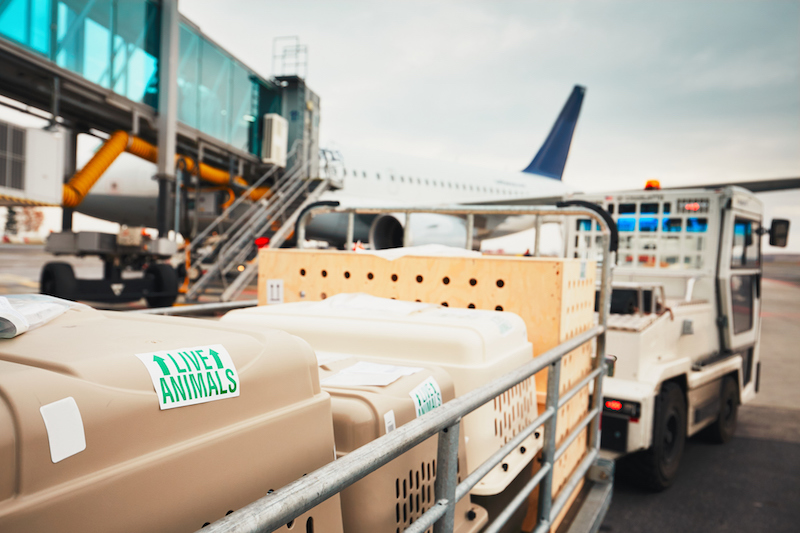
Debate ignites over regulating service and support animals on airplanes and in public accommodations.
When he boarded his plane, Martin Jackson simply wanted to sit in his assigned seat. But when Jackson maneuvered around a passenger seated with an emotional support dog, the dog lunged for Jackson’s face. Jackson sustained facial wounds requiring 28 stiches and has sued the other passenger, alleging that the dog was not properly qualified as an emotional support animal. Because of this attack and other similar incidents, scholars, regulators, and concerned individuals have pushed for laws that prevent the abuse of service and emotional support animal regulations.
In a recent paper, Loyola Law School Professor Sande Buhai argues that laws regulating service and support animals are complicated and incoherent, leading to easy abuse. To provide companies with a clearer understanding of their responsibilities and to reduce the exploitation of these regulations, Buhai proposes several solutions, including a certification program for all service and emotional support animals, along with criminal penalties for abuse of these regulations.
Several federal laws govern instances when individuals with service and emotional support animals may be accommodated. For example, the Americans with Disabilities Act (ADA) applies to service animals used in public accommodations, the Air Carrier Access Act (ACAA) provides protections for people using service animals while flying, and the Fair Housing Act (FHA) regulates the use of service animals in housing.
The laws differ in their requirements. The ADA accommodates only individuals with “service” animals—animals that perform tasks and complete work for the disabled. But the FHA and the ACAA accommodate individuals with both service animals and “emotional support” animals—animals that provide companionship and help with depression and anxiety, for example.
Regulations also differ concerning whether they permit companies to request documentation. Although companies cannot ask for documentation under the ADA, housing providers can request documentation under the FHA.
To prevent individuals from taking advantage of these differences in the law and misrepresenting unqualified pets as service or emotional support animals, Buhai proposes that states impose a certification and licensing program requiring owners to register their animals with the state. To register, individuals would need to present certification issued by an accepted animal training agency. New Hampshire already imposes a similar system.
In addition, Buhai argues that the ADA should be amended to allow places of public accommodation—facilities used by the public such as restaurants and hotels—to check for certification. Currently, such places cannot ask for documentation.
But other scholars contend that more stringent requirements would be inappropriate. For example, University of Illinois Professor Sarah Albert argues that stricter regulations inflict unfair costs on the disabled. Under a system like New Hampshire’s, individuals with disabilities may have to pay for a license or certification, or both. Moreover, stricter regulations create more inconveniences for disabled individuals, such as having to visit a doctor just to receive a letter explaining why the animal is needed.
International Association of Assistance Dog Partners Chair Joan Froling worries that stricter regulations may disrupt the fight for disability rights. After gaining rights for the disabled, harsher rules governing the use of service animals may serve as a setback.
Buhai, however, argues that without tighter regulations, those who truly need service and support animals may be hurt in the long term. Prior conduct by fraudulent service animals may lead organizations to refuse servicing those with true disabilities, despite the law.
On the other hand, Albert argues that disabled individuals may worry that their confidentiality would be breached under a registration system. In response, Buhai says that checking identification would be less invasive than the ADA’s current requirements. Under the ADA, places of public accommodations can ask two questions when the answers are not readily apparent: whether the animal is required because of a disability, and what tasks the animal is skilled to perform. Buhai contends that a licensing system would be less “awkward.”
To curb abuse further, Buhai argues that individuals who misrepresent their pets as service or support animals should be subject to criminal penalties, as currently authorized by 19 states. Other scholars argue that these laws may not be that effective. Michigan State University College of Law Professor David Favre says that criminalizing the misrepresentation of service or support animals is merely symbolic, as states often do not enforce existing laws that criminalize such conduct. Although the threat of criminal penalties may be empty, Favre still believes the threat alone could “scare some people into being honest.”
Other disability advocates say criminal penalties should be minimal. National Disability Rights Network attorney Ken Shiotani argues that authorities should focus on educating those who misrepresent pets as service and support animals, rather than punishing them.
Some proponents of service and emotional support animals contend that concern over the abuse of current regulations is overblown. The media inflate the frequency of service and support animal misrepresentation, one commentator says. And bad actors exist everywhere: People abuse the rules for every system.
Amidst the legal issues, businesses have capitalized on service and support animal misrepresentation. Even though the ADA does not establish a registration system, Amazon sells service animal identification cards with a “registry number” that individuals can use to enter public places with their animals. Pet owners can also purchase an emotional support card by registering their animal on several private databases.
The U.S. Department of Transportation reportedly plans to issue new rules on airline travel with animals. Delta Airlines recently imposed strict rules for all service and support animals, requiring passengers to submit documentation 48 hours in advance. United Airlines also instituted similar requirements, but the new rules only apply to passengers traveling with emotional support animals, not service animals.
Congress has not recently considered updating the ADA’s service animal provisions.



